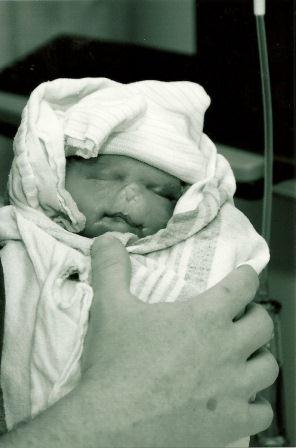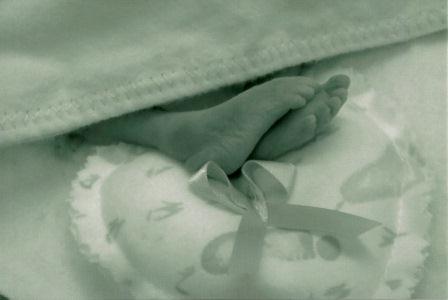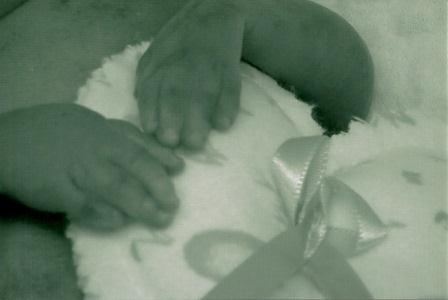Izabel’s Story
|
|
|
Everything was going along pretty smoothly. I had some morning sickness, (more than the boys but not unbearable) I was still able to run, and I wasn't gaining TOO much weight. It was an exciting time as we were preparing for our wedding and now expecting! One week prior to our wedding, Monday September 10th, is a day we will NEVER, EVER forget. We had our first visit with the perinatologist. My OB told me that due to having previous high risk pregnancies, and because of my age, I should see a specialist. At our specialist appointment, we heard things about our baby that we would never forget. The doctor came in to review our sonogram. He stated, “he needed to look some more” and told us, “there is something wrong with your baby….something very very wrong.” At that time, the specialist encouraged us to do an amniocentesis to see what the problems might be in our little one. He informed us that the baby had hydrops (a condition where fluid is inside the baby in 2 or more critical areas). Hydrops is a deadly diagnosis most of the time, and is also a symptom that something else is wrong. We proceeded to do the amniocentesis and blood tests to rule out anemia in our tiny child. I was somewhere between 14-15 weeks at this time. He encouraged us to come back on Thursday of that week so that he could look again at our baby and hoped to have results back on the tests. But the test results, and many other doctor visits later, proved inconclusive. We waited and prayed through many weeks of uncertainty.
I got the pleasure of carrying Miss Izabel Grace Kaiser until 11-28-12 when she was delivered via c-section. I was 27 weeks along when her heart rate tones became very erratic. I knew that something wasn’t right! I called my OB and he told me to immediately go to the hospital to be monitored. Within about 45 minutes from arrival at the hospital, we were informed by our maternal fetal doctors that we needed to deliver her if we wanted to ‘spend some time’ with our dear daughter. I knew what this meant, and I wasn’t ready to say hello and most likely good bye that day. Our Izzie was severely hydropic at birth. She had fluid in her belly, surrounding her lungs, and under her scalp. The fluid was so severe it damaged the skin on her legs. Our tests came back normal, and, ultimately they couldn’t find an airway to be able to help her breath, so she passed away. Izzie was with us for about 15-20 minutes and then grew her angel wings. We spent a few hours with her after her birth holding her and looking at her. She was beautiful and had none of the ‘oddities’ that doctors thought she would.
Jack and I went to all the doctor appointments that were recommended and we chose to fight for our baby. Many opinions were that we should terminate our unborn child because her chances weren’t good. We had all of the tests and sonograms, yet the cause of Izzie’s hydrops remains unknown. She will forever be our daughter and now we fight for more people to be able to find a cause and a solution for their babies hydrops!
What is Hydrops Fetalis?
Hydrops fetalis, or hydrops, is a condition that occurs when large amounts of fluid buildup in a baby’s tissues and organs causing extreme swelling.
What causes hydrops fetalis?
Many different diseases and other medical complications can cause hydrops fetalis, such as:
Non-immune Hydrops (This is the type Izabel Grace Kaiser had):
- • Severe anemia
- • Infections present at birth
- • Heart or lung defects
- • Chromosomal abnormalities and birth defects
- • Liver disease
Immune hydrops fetalis is no longer very common due to advances in the prevention of hemolytic disease of the newborn. Non-immune hydrops fetalis occurs in approximately one of every 1,000 births. About half of unborn babies with hydrops fetalis do not survive.
OSF Maternal Fetal
OSF Perinatal Supportive Care services provides a program that continues to grow and evolve to meet the needs of the families we serve. We are consulted to participate in the care of families from the time of a serious prenatal diagnosis or death, through a period of bereavement follow-up. Our interdisciplinary team includes perinatologists, neonatologists, genetic counselors, nurses and counseling services. This team provides education and support to the expectant mother and family. Supportive Care develops a birth plan with the parents to coordinate care for their child’s delivery and care after birth. Our goal is to respect and honor their wishes. Our counselors are available on an inpatient and outpatient basis for as long as services are necessary. Perinatal loss is a unique, lifelong parenting and bereavement experience. OSF Perinatal Supportive Care functions as a guide to the family, anticipating their needs, offering positive choices, and connecting with them in a meaningful way.
Above taken from Childrens Hospital


